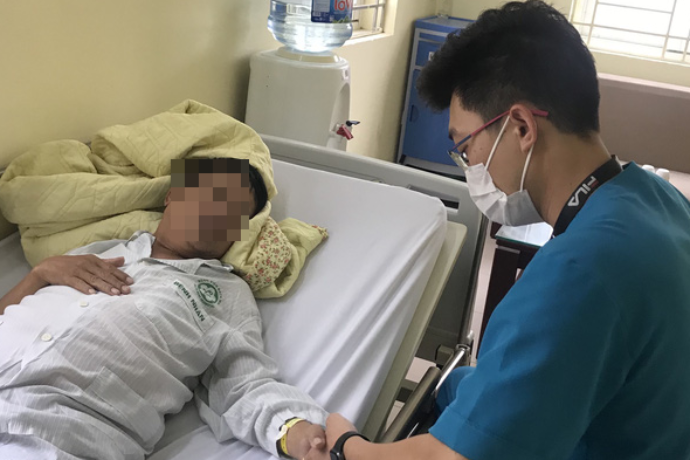
In February 2023, N.D.N, 28, in Thai Binh City died from a cerebral hemorrhagic stroke. His relatives said N went out that day, got home late, and fell onto the ground when he was in the toilet. The man was hospitalized after his situation was discovered, but it was too late.
After his death, Huong, his younger sister in HCM City, and her family members rushed to the hospital to have stroke screening tests. Though the stroke screening test is very expensive, Huong still ordered a magnetic resonance imaging (MRI) test.
Many people are willing to spend big money, from millions of VND to tens of millions of dong on disease screen tests.
When a VietNamNet reporter contacted a private hospital in Hanoi and asked about the stroke screening service package, he was recommended to have such a service as soon as possible, because stroke spares no one.
Asked about the service fee, an officer of the hospital said the total fee depends on the service package chosen by patients. The reporter was told to leave personal information so that doctors could contact him later and give advice about the tests needed.
VietNamNet found that the service is available at most large hospitals, especially private ones. The service is advertised on websites, Facebook and billboards. Anyone can contact hospitals through hotlines for advice.
All the hospitals say that patients can have medical examinations with the best specialists and most advanced machines.
What do the experts say?
Dr Nguyen Huy Thang, chair of the HCM City Stroke Association, and head of the Cerebrovascular Disease Department, at the HCM City People's Hospital 115, said that stroke, together with heart disease and cancer, are the three major causes of deaths. Even if patients live after stroke, many of them lead difficult life afterwards. In many cases, patients become disabled and cannot go back to work.
“We often hear information about celebrities dying suddenly from stroke, so the worry about stroke exists in the community. Hospitals, understanding the concern, offer stroke screening service packages,” Thang said.
However, he said people should not believe in advertising campaigns about comprehensive stroke screening. There is no need to have a brain MRI on a normally healthy person to screen for a stroke.
He said that in the US, doctors don’t recommend that people have a brain MRI for stroke screening. In general, the effectiveness and necessity of screening or genetic testing for stroke screening remains unclear.
To avoid stroke, Thang said people aged over 55 should have periodic health examinations and take basic tests such as complete blood and blood pressure.
Thang emphasized that stroke rarely occurs to a person with no underlying conditions. Most of the patients brought to his hospital are those who don’t strictly follow prescribed treatment, or who take medicine regularly but stopped some kinds of medicine, or did not prevent risk factors.
The stroke screening should focus on identifying risk factors that might not have been discovered before, for example, high blood pressure, diabetes, hypercholesterolemia, smoking, drug use, or obesity.
“If you have these factors, your doctor will give advice on preventive measures against stroke,” Thang said. “Taking too many screening service packages will be costly and ineffective."
He said that it is quite possible to prevent stroke by changing lifestyle and practicing physical exercises regularly. Those people who are in the state of obesity need to lose weight, give up smoking and take medical tests at least once a year.
Ass. Prof. Nguyen Hoai Nam from the HCM City University of Medicine and Pharmacy said that recommendations on stroke screening expansion may cause confusion to the community.